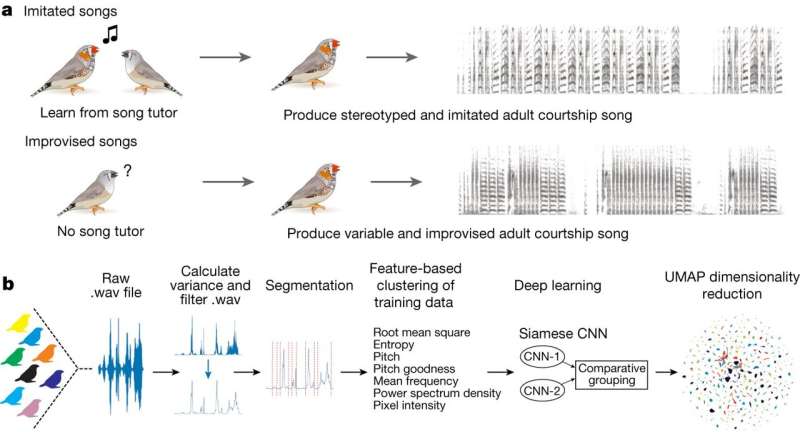This article has been reviewed according to Science X's editorial process and policies. Editors have highlighted the following attributes while ensuring the content's credibility:
fact-checked
peer-reviewed publication
trusted source
proofread
Female zebra finches seek mate who sings one song just right

Humans aren't the only living beings who find a singing voice attractive in the opposite sex—songbirds do too. For about a third of the approximately 4,000 songbird species that sing only one song, the features that make these tunes alluring to a potential mate have been a long-standing mystery.
In a new study, researchers at UT Southwestern Medical Center used artificial intelligence (AI) to analyze the songs from zebra finches to identify qualities that indicate sexual attractiveness. Their findings, published in Nature, show that female birds detect cues in males' songs far too intricate for the human ear to decipher.
"For decades, scientists have tried to understand how a single song could signal reproductive fitness and allow females of the species to select among male suitors. Our research suggests that female songbirds are assessing male fitness in a much more complex way than previously thought," said Todd Roberts, Ph.D., Associate Professor of Neuroscience at UT Southwestern and a Thomas O. Hicks Scholar in Medical Research. Dr. Roberts is also an Investigator in the Peter O'Donnell Jr. Brain Institute at UTSW.
Dr. Roberts co-led the study with Danyal Alam, Ph.D., a former graduate student in the Roberts Lab and currently a postdoctoral fellow at the University of California, San Francisco.
Zebra finches, which are often kept as pets in the U.S., are the most studied songbirds, Dr. Roberts explained. As with other songbirds, only the males sing, learning and imitating by 3 months of age the same three to seven "syllable" songs crooned by their fathers. Other research, in which scientists separated male birds from their fathers during this critical period, showed that these birds sing improvised songs. However, birds that sing these makeshift tunes are less likely to attract a mate, suggesting females prefer mates that imitate songs over those that improvise them.
Building on this research, Dr. Alam developed an AI program he named the Deep Avian Network (DAN), which analyzed the acoustic features of the songs of 49 zebra finches in the Roberts Lab. About half of these birds sang songs imitated from their fathers, and the other half sang improvised songs. Using data from nearly half a million syllables, DAN clustered those that shared features onto a visual map.
When the researchers analyzed the maps, they found the path between the clusters to be significantly longer for imitated songs than for improvised ones, indicating the imitated songs had more complexity, although this intricacy was indistinguishable to humans, Dr. Roberts said.
To determine whether this complexity was more attractive to female zebra finches, the researchers developed synthetic songs with features of the longer- and shorter-path songs. They then allowed female birds to fly freely in a simple T-shaped maze and played the contrasting songs at opposite ends. Females spent significantly more time in the end where the longer-path (imitated) song was played, a sign that they found it more appealing.
The researchers, seeking to learn why these songs might signal sexual fitness, used DAN to analyze imitated songs from fathers and their offspring. Although offspring readily imitated songs with syllables that clustered in shorter paths, those whose fathers sang more complex songs were less likely to faithfully replicate these features, an indication that these songs were more difficult to learn.
Having the resources and mental acuity to learn these more difficult songs might be more attractive to potential mates, Dr. Roberts explained. He and his colleagues plan to test in a future study whether birds that sing more complicated songs, as determined by DAN, are more likely to produce offspring than those singing simpler songs—the real test of reproductive fitness.
More information: Danyal Alam et al, The hidden fitness of the male zebra finch courtship song, Nature (2024). DOI: 10.1038/s41586-024-07207-4
Journal information: Nature
Provided by UT Southwestern Medical Center




















